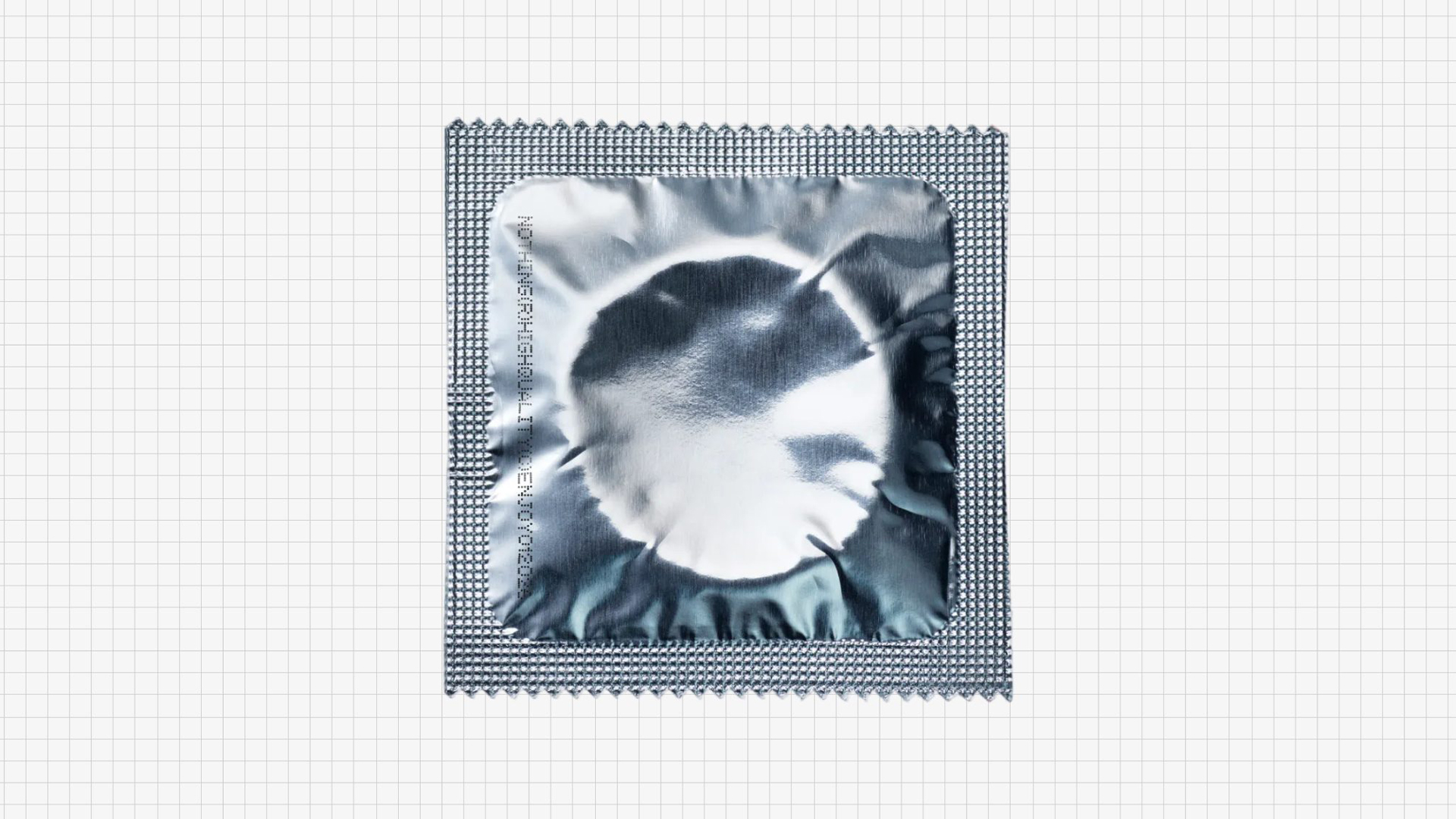Sign up to Creative Bloq's daily newsletter, which brings you the latest news and inspiration from the worlds of art, design and technology.
You are now subscribed
Your newsletter sign-up was successful
Want to add more newsletters?

Five times a week
CreativeBloq
Sign up to Creative Bloq's daily newsletter, which brings you the latest news and inspiration from the worlds of art, design and technology.

Once a week
By Design
Sign up to Creative Bloq's daily newsletter, which brings you the latest news and inspiration from the worlds of art, design and technology.

Once a week
State of the Art
Sign up to Creative Bloq's daily newsletter, which brings you the latest news and inspiration from the worlds of art, design and technology.

Seasonal (around events)
Brand Impact Awards
Sign up to Creative Bloq's daily newsletter, which brings you the latest news and inspiration from the worlds of art, design and technology.
PSVR 2 is out now, and is Sony's true next-gen virtual reality headset that uses PlayStation 5 to bring its games to life. This is cutting-edge hardware that promises state-of-the-art experiences and games using haptic controls and high-spec VR tech.
In this guide I'll take you through everything that's known about the PlayStation VR2 to date. The headline facts are it's out now and priced $549.99 / £529.99, and the basic package will be the PS VR2 headset, PS VR2 Sense controllers and stereo headphones. You can find out more in my PSVR 2 review, too.
Below I'll dig into this package, as well as look at what bundle deals will be are offer and I'll take you through the specs, design, price in detail, the accessories, and the games you can play from launch and beyond. Finally, my frequent questions section will answer any lingering or confusing details.
If you've yet to buy a PlayStation 5, then read my PS5 review that looks at two years of Sony's console. Also, read our feature 'PlayStation VR 2 developer reaction' to discover what the pros think. In the meantime, if you're looking for a VR headset now, take a look at our picks of the best VR headsets currently available.
If you're keen, you can order a PSVR 2 at the PlayStation Direct Store but you'll need an account to register your interest. (Looking ahead, read my guide to 2023's most anticipated games.)

Ian is the former editor of the Official PlayStation Magazine and has been a video game journalist for more than 20 years. He's worked across many video games magazines, including PlayStation World and launched Play Magazine in 2020. He has owned and written about every PlayStation console since 1998 across print and web.
PSVR 2: what is it?
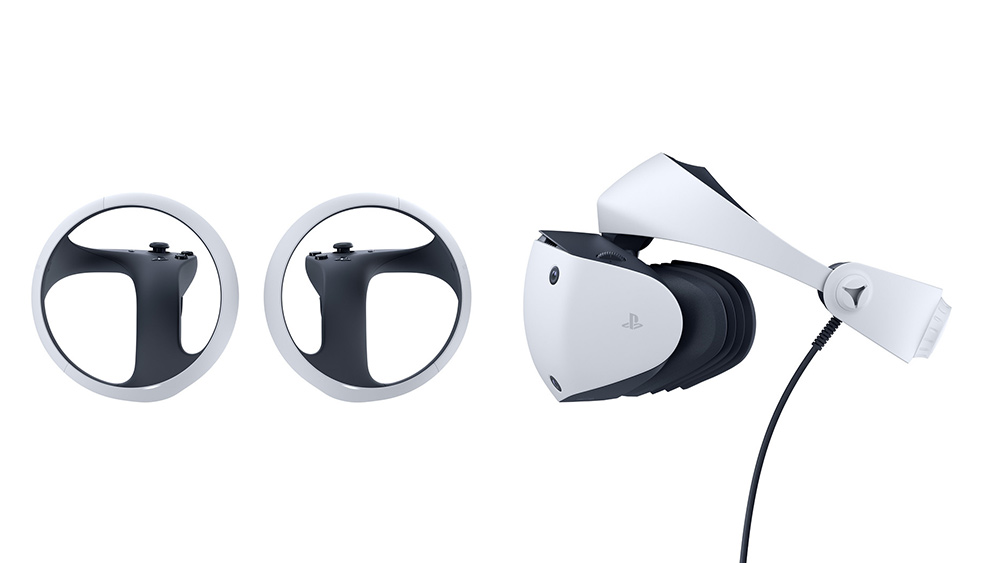
The PSVR 2 is the follow-up to Sony's successful PSVR headset, which introduced cheap, accessible VR to gaming on the PS4. It's a virtual reality headset that will be exclusive to the PlayStation 5, making use of the power of Sony's latest console. PS5 is the most successful next-gen console, and if Sony gets the PlayStation VR2 right then VR gaming is likely to truly take off.
While PSVR 2 is still a wired headset, for the price many experts are already calling this new virtual reality hardware a win for Sony. Oculus VR founder Palmer Luckey took to Twitter during the recent CES show and wrote he was "was blown away" by PSVRv 2. He added that in his mind the original PSVR was "arguably the biggest success of the generation," and he feels PSVR 2 is on course to be just as important.
Sign up to Creative Bloq's daily newsletter, which brings you the latest news and inspiration from the worlds of art, design and technology.
Making use of the new headset's tech and the PlayStation VR2 Sense controller's haptic feedback and adaptive triggers, Sony promises PSVR 2 will offer a heightened range of sensations. The company says it will offer a high-resolution display for each eye, faster refresh rates, a wider field of view, and improved tracking and input.
It certainly sounds impressive, and Sony has good form to back it up. The original PSVR sold more than five million copies, was low-cost, and came with a line-up of exclusive games. At a time when VR struggled on PC, Sony's affordable and accessible headset proved a success. The PSVR 2's price point isn't quite as cost-effective as the original VR headset, so I expect there could be a slower take-up, but this a genuine next-gen follow-up and Sony has some superb games and franchises in the works for PSVR 2.
PSVR 2: price and release date
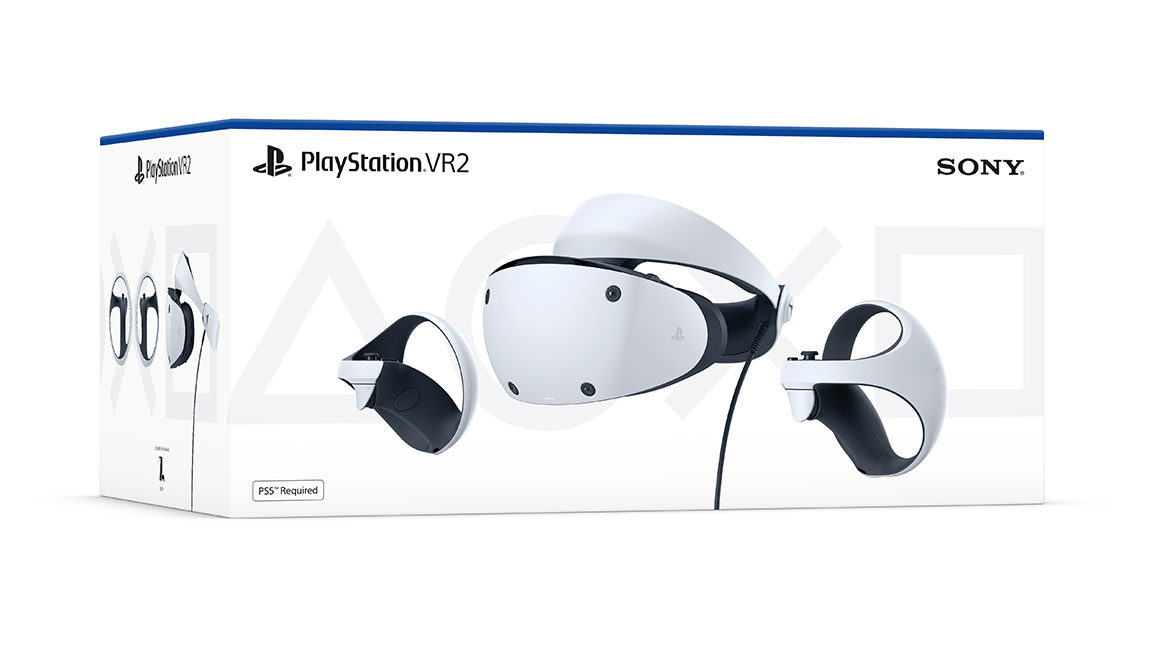
So, let's hit the big money-shaped elephant in the room. The new PlayStation VR 2 is going to be expensive, in fact more expensive than the PS5 itself. The basic PSVR 2 bundle (so no game) will be $549.99 / £529.99. At launch, the original PSVR cost $499 / £399, so we're looking for a not-bad $50 price increase in the US but a whopping £129.99 rise for UK gamers.
Considering Meta Quest 2 sells for $399 / £399 and the higher-spec Meta Quest Pro is $1,499.99 / £1,499.99, Sony pitching its next-gen headset at $549.99 / £529.99 is a gamble to appeal to early adopters, but it could shun the VR-newcomers that PSVR picked up. It's worth noting here the PSVR is largely a step ahead of Meta Quest 2 due to its displays, haptics and PS5 connection. Even against Meta Quest Pro, overall, PSVR 2 looks good value for its price considering the resolution of the displays and inclusion of head- and controller-haptics.
There is a caveat, naturally you'll need to own a PS5 to use a PSVR2, so that cost will double. You can track the latest prices and availability on our best PS5 deals page. Read my guide to the best games consoles for more on PS5.
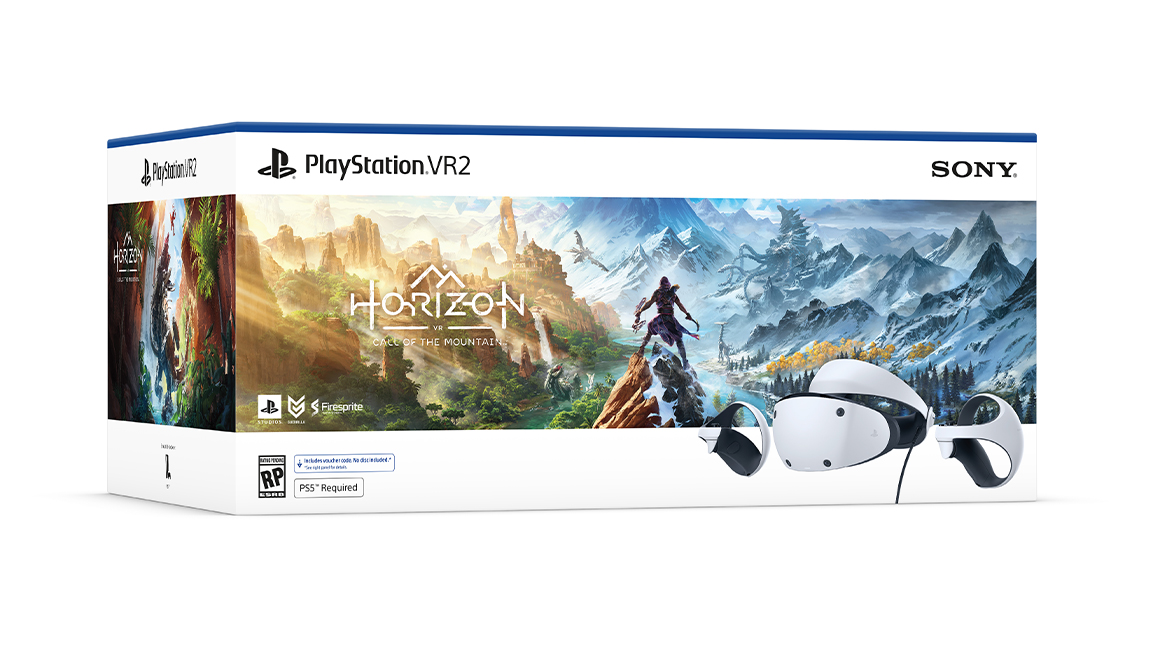
Sony is aware its biggest asset are its exclusive games. At launch alongside the basic PlayStation VR 2 bundle Sony will release a special PlayStation VR2 Horizon Call of the Mountain bundle. This will be priced at $599.99 / £569.99 and will include a PlayStation Store voucher code for Horizon Call Of The Mountain, Sony's exclusive VR entry in its Horizon franchise, as well as the PSVR 2 headset, PSVR 2 Sense controllers and stereo headphones.
There will also be a separate PlayStation VR 2 Sense controller charging station released alongside the headset, priced $49.99 / £39.99.
I should bundle offers to exist at launch that maybe offer extra games, PS Plus subscriptions of the PlayStation VR 2 Sense controller charging station to make that cost more justifiable. I would also expect there to be a limited run on the supply of PSVR 2, so keep that in mind.
PSVR 2: specs
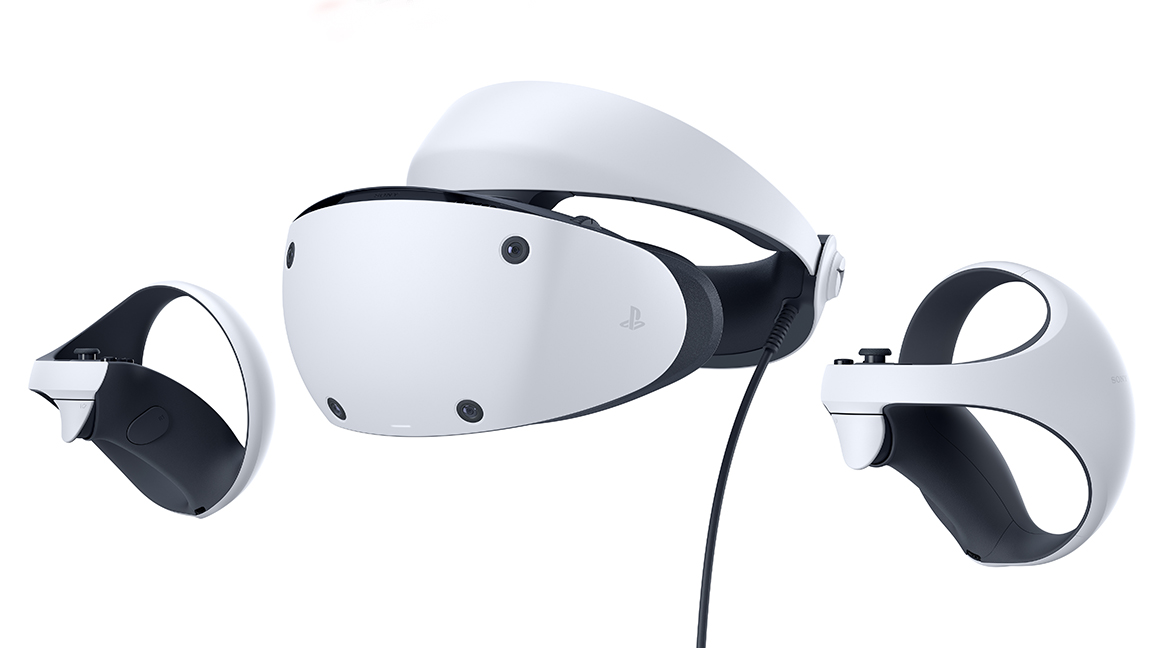
Sony revealed the full specs for the PSVR headset at CES 2022 in January, including its weight, screens, audio and more. It's also released 3D renders of what it will look like (see above and below).
The issue with VR is always that it's better to experience than it is to view from afar. Luckily Sony has offered hands-on time with the headset that has revealed some neat ways to make PlayStation VR2 as user-friendly as possible.
For example, PSVR 2 uses eye-tracking technology and needs to measure your pupillary distance, or IPD, and this is calibrated by offering a head to view inside the device, eye holes are cut out and glow blue, and by adjusting the headset's positioning on you, those eyes turn green. Simple.
Another huge addition is the use of passthrough video, which enables you to use the headset's cameras to view the world 'outside' as you play. This is great for adjusting your space for play, by drawing an outline but the PSVR 2 also scans your surroundings and sets a zone automatically. As someone who has destroyed lamps, mugs and all sorts while using PSVR, this is a fantastic quality-of-life-upgrade. A button on the headset enables you to instantly see your surroundings, ideal if you've forgotten where you left your PSVR 2 Sense controller.
PlayStation VR 2 specs in detail:
- Display method: OLED
- Panel resolution: 2000 x 2040 per eye
- Panel refresh rate: 90Hz, 120Hz
- Lens separation: Adjustable
- Field of view: Approx. 110 degrees
- Sensors: Six-axis motion sensing (three-axis gyroscope, three-axis accelerometer)
- Tracking: 4 cameras for headset and controllers, IR camera for eye tracking per eye
- Feedback: Vibration on headset
- Connection to PS5: USB Type-C
- Audio input: Built-in microphone
- Audio output: Stereo headphone jack
The PlayStation VR2 specs are impressive, and include headset feedback, eye tracking, 3D audio, and the same adaptive triggers and haptic feedback found in the PS5 DualSense controller are integrated into the PS VR2 Sense controllers. The display uses 4000 x 2040 HDR video format (2000 x 2040 per eye), and a 90Hz, 120Hz refresh rate, so games are going to look incredible.
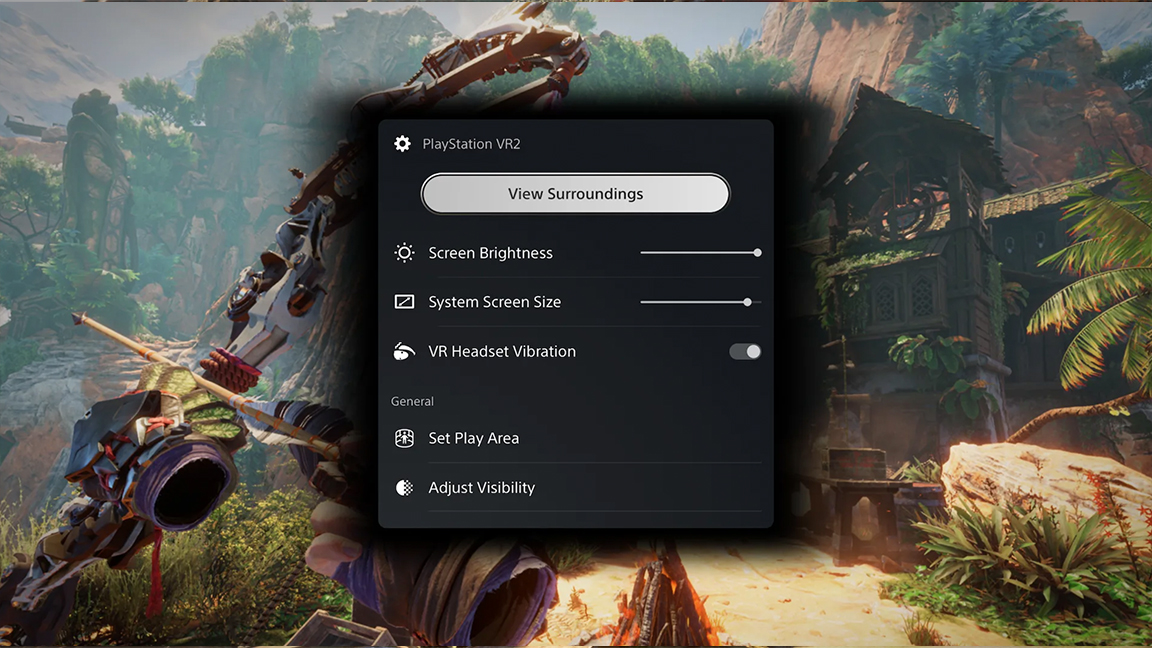
One key upgrade we learn from the specs is the 6DOF inside-out tracking, which means the tracking range and detail of PSVR 2 is far ahead of the original PSVR headset. You're no longer confined to a small square but can walk and move pretty much as far as the lead allows. The improved tracking should also reduce any latency or drift when using the PlayStation VR 2.
Another major addition is the inclusion of foveated rendering – a rendering technique that uses eye tracking to reduce the rendering demands on the hardware. This should in practice enable developers to create more detailed and larger VR worlds.
PSVR 2: design
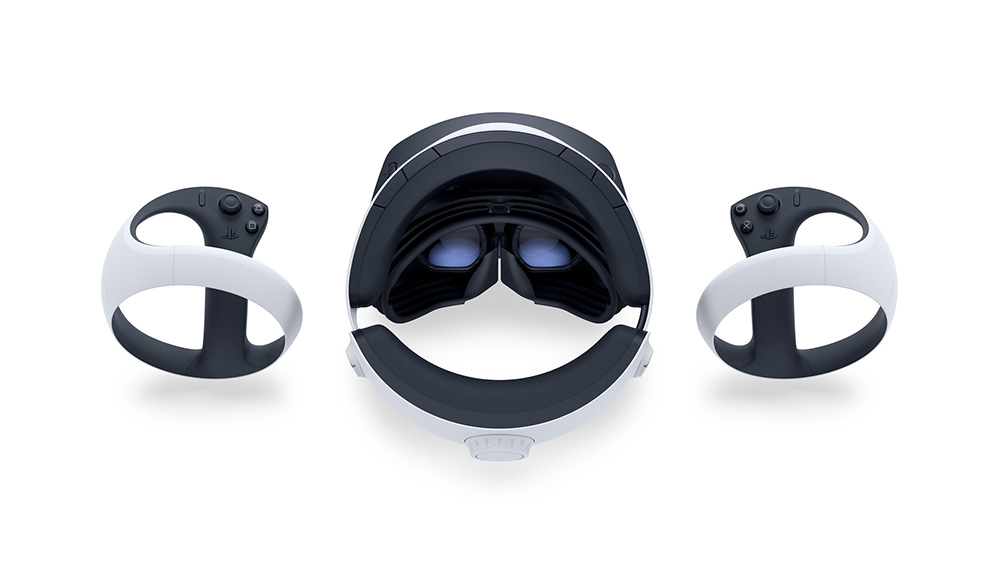
The Playstation VR 2 riffs on the same flowing design lines of the PS5 itself. The PSVR 2 sports a similar white and black dual-tone, smooth lines, rounded shapes, and elegant design. It also builds on the same form and user experience of the original PSVR headset, which proved incredibly accessible.
The headset has a similar orb-like shape to the PS VR2 Sense controller (see below), designed to represent the 360-degree view players feel when they enter virtual reality. Partly thanks to a smaller processor, it's a little slimmer and more balanced than the original PSVR headset. The PlayStation VR 2 is wired like the original headset, which is a disappointment, but if this means Sony can bring the cost down it's worth the investment in cable ties.
Aside from looks, it's how PSVR 2's headset feels to use that sets it apart from other PC VR headsets. A haptic feedback motor similar to that found in PS5's DualSense controller sits inside the PSVR 2 headset – this is a first for VR. This means developers can use the haptics to simulate the surroundings directly to the player; image sensing rain landing on your head or the wind blowing across your face.
In practice it results in small rumbles around your head and brings you closer to the action – in VR this small adjustment can be startling. It's more than a replacement for that classic head-shake you get in games, as these head-haptics can present 360 degree game-effects; a bullet ricochet behind you the PSVR 2 rumbles from that spot.
As well as enhancing the VR experience the use of haptics can also finally do away with motion sickness. This sick feeling you can experience in VR comes from the dissociation of the head and the body. Sudden acceleration in a game can cause dizziness but if it's matched with expected senses. For example, wind hitting your face or vibrations of tarmac; your senses will be duped into believing it's real.
PSVR 2: Sense controllers
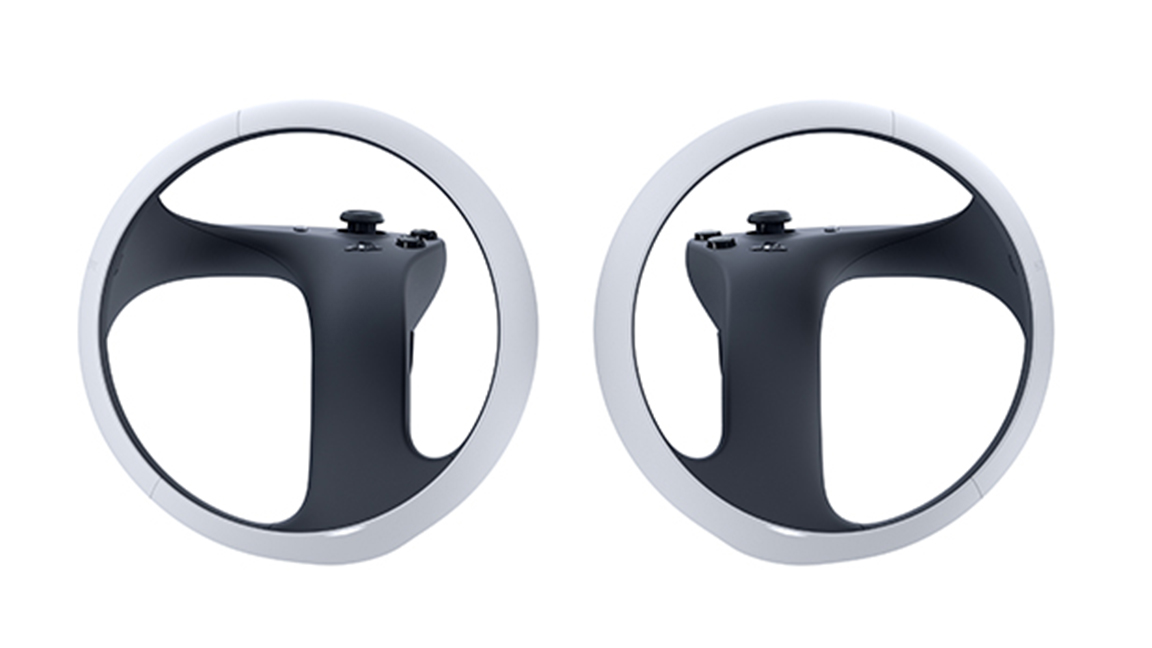
The ageing PS Move controllers (that launched in 2010 for PlayStation 3) are finally being shelved in favour of modern VR controllers. More so, Sony is bringing the same level of tech and user experience offered by PS5 and the DualSense controllers to the PlayStation VR2 Sense controller. More so, developers know every PSVR owner has two controllers so all games can be created with this as standard.
The PSVR 2 controllers feature slim tube-like handles with a plastic orb around them, DualSense-like adaptive triggers allow for differing tensions when pulled, likewise haptic feedback simulates materials and conditions against your digits.
PSVR 2 Sense controllers specs in detail:
- Buttons: [Right] PS button, Options button, Action buttons (Circle / Cross), R1 button, R2 button, Right Stick / R3 button
[Left] PS button, Create button, Action buttons (Triangle / Square), L1 button, L2 button, Left Stick / L3 button - Motion Sensor: Six-axis motion sensing system (three-axis gyroscope + three-axis accelerometer)
- Capacitive Sensor: Finger Touch DetectionIR LED: Position Tracking
- Feedback: Trigger Effect (on R2/L2 button), Haptic Feedback
- Port: USB Type-C
- Connectivity: Bluetooth
- Battery: Built-in Lithium-ion rechargeable battery
This is the now industry-standard VR controller (for example, Oculus) and features a thumbstick, buttons, grab button, and trigger on each controller. Anyone who's used a DualShock 4 or DualSense controller with the existing PSVR will understand what a clumsy dance it can be to make VR controls work on these non-VR pads.
The finger touch detection tech is where the PSVR2 Sense controller will show its VR muscle, it means a game can detect where your fingers are in relation to the buttons and enable finger and hand gestures to be used to perform actions.
All in, the PSVR 2 Sense controller is an advanced piece of kit that will give developers new ways to enable us to experience VR, including simulating the sense of wind blowing over your hands and the headset. VR worlds are really going to feel real and intimate.
PSVR 2: displays
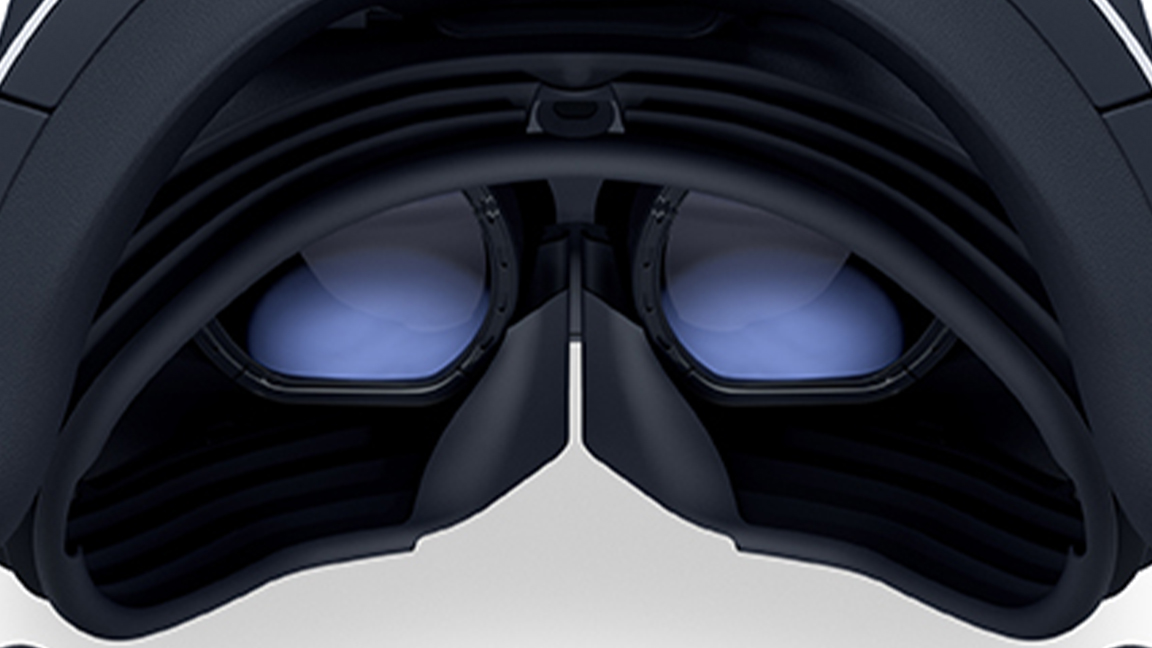
PSVR 2 will feature two OLED screens, one for each eye. OLED displays far better colour representation and black levels than the LCD panels used in current VR headsets, such as the Meta Quest 2. Boasting resolution of 2000 x 2040 pixels per eye for each OLED display, giving it a total resolution higher than 4K, the PSVR 2's screens will be unmatched at launch.
Just like the PS5, PSVR 2 will support HDR, which widens the colour palette ensuring games will look rich and vibrant (and match the performance of PS5). By supporting 90Hz and 120Hz modes we'd gauge Sony is giving developers a choice between performance and quality modes, just as you'd find in many PS5 games. It also suggests games for PSVR 2 will be varied in style, offering a mix of experiences and hardcore games, such as shooters running at 120Hz.
Having such high-resolution displays means the new VR Mode will become a popular addition. This enables you to view VR content in a 360 virtual environment, which is displayed in the headset's 4000 x 2040 HDR video format.
Likewise in Cinematic Mode you can view the PS5 UI and watch films and events in a virtual cinema screen. Movies and Blu-rays watched in Cinematic Mode will be displayed at 1920 x 1080 HDR video format, with 24/60Hz and also 120Hz frame rate. I'd imagine Sony will make use of this to offer sports events and concerts to users, as well as films.
A new addition to ease motion sickness. PSVR 2's field of view (FoV) will be 110-degrees (PSVR is 100-degrees), which means you'll see more of the VR world without moving your head. An easy solution to overcoming motion sickness is by 'coning' the field of view when moving, with a greater FoV to play with developers can show more of the world when this is being done.
PSVR 2: games
The bad news is, PlayStation VR 2 won't be backwards compatible with PSVR, which is a shame as many gamers have collections of VR games and would love to play this on better tech, and they already work on PS5. The good news is there will be more than 30 games at launch, and you can see them all in the six minute video above.
Sony has developed PSVR 2 as a new games platform and many of the new features can't be downgraded to PSVR titles. For example the new PSVR 2 Sense controllers are a three-generational leap over the ageing PS Move controllers.
This isn't new to this generation of PlayStation gamers, as PS5 is only backwards compatible with PS4 games. Sony has resolved the issue a little with older games being offered via emulation on PS Plus, but this may not be the case with PSVR 2.
If you're planning on buying a PlayStation VR 2 at launch then take a look at our guide to the best PSVR 2 games coming soon. This includes new games, remakes, remasters and PSVR 2 upgrades to PSVR games – and now includes a free Gran Turismo 7 upgrade.
However, at the launch of PS5 Sony did offer PS Plus subscribers a special 20-game collection of PS4 titles that had been upgraded with PS5 specs and use of core features, such as haptics and improved frame rates and texture resolution. I'd like to think Sony could create a package of classic PSVR games upgraded to PSVR 2 for legacy console owners – perhaps PSVR 2 editions of Blood & Truth, Farpoint and Iron Man VR. Box are for PSVR 2 games looks to be similar to PS5 games, showing Sony is planning to make the two platforms fully connected in terms of branding.
So what games can you expect to play on day one of PSVR 2's launch? The good news is there are currently 57 confirmed new games for PlayStation VR 2 and all of them promise to make full use of the new hardware's best features, such as the haptics and improved resolution.
The games list includes a mix of established franchises coming to PSVR 2, such as Horizon Call Of The Mountain and Firewall Ultra from Sony and Resident Evil Village and Resident Evil 4 from Capcom, and innovative new games such as Firmament that promises incredibly lifelike environments. Better news, Capcom has announced the PSVR 2 mode for Resident Evil Village will be free to owners of the game, making this one of the hardware's best-value games.
Other notable highlights include shooter The Walking Dead: Saints & Sinners Chapter 2, Star Wars: Tales from the Galaxy’s Edge and Dark Pictures: Switchback VR from horror and narrative experts Supermassive Games.
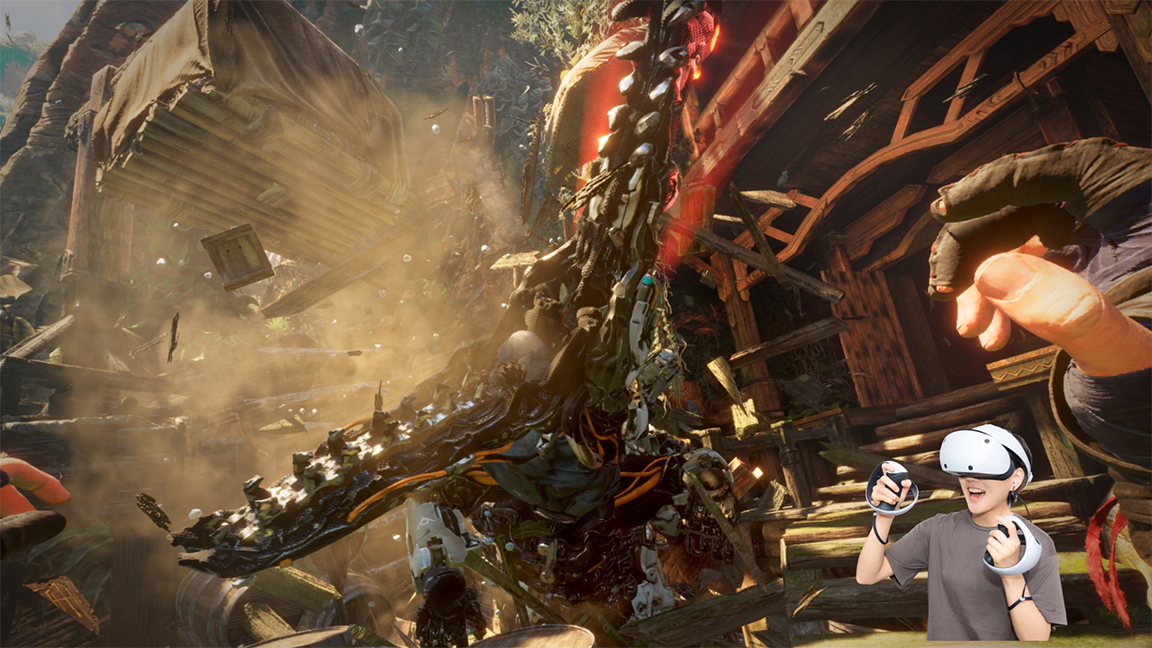
As well as the new titles PSVR 2's UI will offer new ways to play and display yourself in the games. A broadcast feature will enable you to film yourself while you're playing a game and follows on from PS5's social and streaming tools. You'll need a {S5 HD camera plugged into the PS5, but this will be an easy way for streamers to get up and running with PSVR 2 channels and videos.
PSVR 2: frequent questions
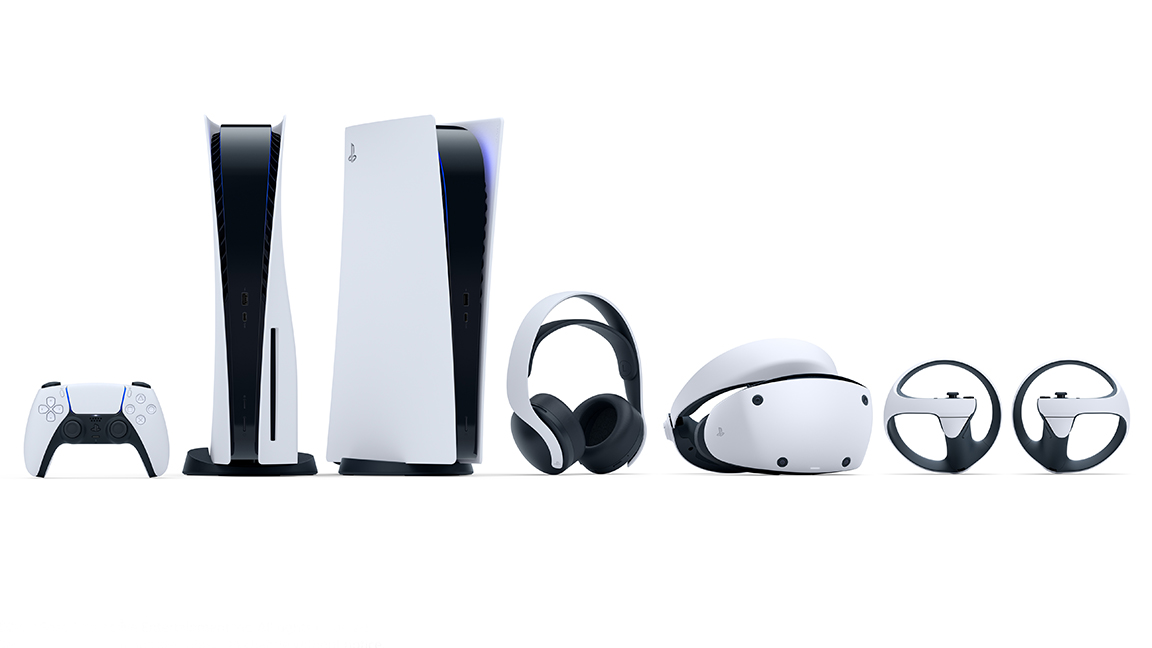
Will PSVR 2 be wireless?
No, but there are less cables to worry about than the original PSVR. The new PlayStation VR 2 connects to PS5 using a simple USB-C cable. For VR pros wired headsets are still the best and PSVR 2 can make the most of PS5's power. Being wired, PSVR 2 can run up to 120Hz.
Will PSVR 2 have improved tracking?
Yes. PSVR 2 will have improved tracking, which is based on similar technology to that found on Meta Quest 2. This is called inside-out tracking and uses four cameras set in the PSVR 2 headset that track your position in a room, and also aided by tracking in the PlayStation VR 2 controllers.
The new PSVR 2 controllers feature a series of infrared LEDs that can be tracked by the cameras in the headset, and can give feedback info to the SixAxis sensors inside the controllers and headset. Basically PSVR 2 is pinging data all around you and picking up info our where you are and what you're doing, ensuring gesture and motion in PSVR 2 games will become a staple of the hardware's gameplay design.
Why does eye-tracking matter?
Games are known for focusing performance where it matters; for example there's not reason to waste band width rendering a section of a city you're not playing in. PSVR 2's eye-tracking tech takes this approach to incredible new levels. PSVR 2 will improve the graphics in the exact place your eyes are focused on. This is coupled with Foveated rendering in PSVR 2, which focuses detail on the cone of vision; you are looking at whole down-scaling detail in the peripheral vision.
Using both eye-tracking and Foveated rendering is a huge advantage. It's tracking your eyes, not your head movement, which means there will be no breakdown in image quality (as can be found in Oculus Quest, which only uses Foveated rendering). By upping the resolution of areas of a world you look at and reducing resolution in areas outside of your vision PSVR 2 could increase performance by over 60 percent.
It has a bigger impact, eye-tracking and Foveated rendering together can diminish, if not eradicate, motion sickness.
Is PSVR 2 the start of Sony's metaverse?
This is speculation, but Sony has form for trying to build a metaverse. On PS3 it launched PlayStation Home, a virtual 3D hub-world where players could mingle, chat, play simple games, show off their avatars, and showcase achievements earned in games. You had an apartment that could be decorated with free, bought or earned items. Public spaces were made for display, entertainment, advertising, and networking. When it closed PlayStation Home had 41 million members.
A trademark application, submitted in July 2021, suggests Sony might be considering bringing back PlayStation Home. Sony often registers trademarks simply to keep ownership of an IP or idea, but we can't help but speculate…
Meta is working on its centralised metaverse using Oculus as a platform/headset, Apple is rumoured to be developing something similar for its VR/AR headset, so it's not too far to see Sony relaunch PlayStation Home for PSVR 2; a place we can virtually meet up and play with Astro Bots while watching Spider-Man: Far From Home. Now, if Sony gets into NFTs to support a PSVR 2 metaverse, that would be huge.
Who makes the chips in PSVR 2?
That would be MediaTek, the Taiwanese-based chipmaker who will be delivering two custom chips for PlayStation VR 2. One will be dedicated to the displays and the second will be used in the new PSVR 2 Sense controllers. MediaTek is one of the world's most well respected chip manufacturers for displays and has 70 percent market share of the world's display and 4K smart TV production.
Will PSVR 2 require PS5?
Yes. PSVR 2, unlike Meta Quest 2 and Pro, is a wired next-gen virtual reality headset and uses the power of PS5 to run its games, apps and movies. So you will need a PS5, but also you're guaranteed an incredibly high performance.
Is PSVR discontinued 2022?
No, in fact you'll likely find some excellent deals in January for Sony's older VR headset, the PSVR. Many gamers still use PS4 consoles and the PSVR is compatible with PlayStation 5. If you want to try VR and need a good deal, keep an eye peeled on PSVR offers.
Does PSVR 2 need a camera?
No, the old external camera used by PS5 isn't needed for PSVR 2 as it has four built-in cameras that track your every movement. There's a caveat, however, as if you wish to make use of the new Broadcast feature you will naturally need an HD camera to film you.
Will PSVR 2 be better than Meta Quest 2?
Yes, not only does PSVR 2 have higher resolution OLED HDR displays it also uses dynamic foveated rendering, unlike Meta Quest 2 that still uses static foveated rendering. PSVR 2 also has full haptic immersion and it uses the PS5 as its engine to power games and experiences.
How much will PSVR 2 cost?
PlayStation VR 2 will cost $549.99 / £529.99 for the starter package and will feature the PS VR2 headset, PS VR2 Sense controllers and stereo headphones. Note there will be no game with this package.
Can you use PSVR with glasses?
Just like PSVR, Sony's new PlayStation VR 2 can be used with glasses. The headset can be adjusted to tighten on your face and the visor can be made to fit your glasses.
Read more

Ian Dean is Editor, Digital Arts & 3D at Creative Bloq, and the former editor of many leading magazines. These titles included ImagineFX, 3D World and video game titles Play and Official PlayStation Magazine. Ian launched Xbox magazine X360 and edited PlayStation World. For Creative Bloq, Ian combines his experiences to bring the latest news on digital art, VFX and video games and tech, and in his spare time he doodles in Procreate, ArtRage, and Rebelle while finding time to play Xbox and PS5.
